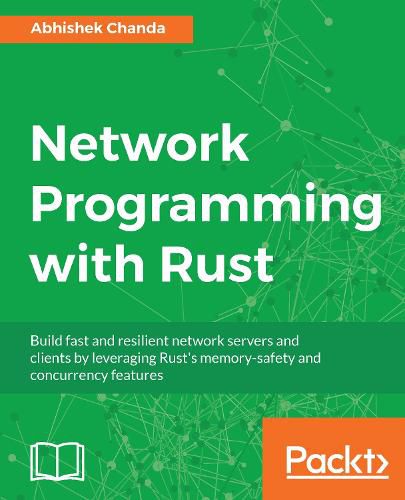Readings Newsletter
Become a Readings Member to make your shopping experience even easier.
Sign in or sign up for free!
You’re not far away from qualifying for FREE standard shipping within Australia
You’ve qualified for FREE standard shipping within Australia
The cart is loading…






This title is printed to order. This book may have been self-published. If so, we cannot guarantee the quality of the content. In the main most books will have gone through the editing process however some may not. We therefore suggest that you be aware of this before ordering this book. If in doubt check either the author or publisher’s details as we are unable to accept any returns unless they are faulty. Please contact us if you have any questions.
Learn to write servers and network clients using Rust’s low-level socket classes with this guide
Key Features
Build a solid foundation in Rust while also mastering important network programming details Leverage the power of a number of available libraries to perform network operations in Rust Develop a fully functional web server to gain the skills you need, fast
Book DescriptionRust is low-level enough to provide fine-grained control over memory while providing safety through compile-time validation. This makes it uniquely suitable for writing low-level networking applications.
This book is divided into three main parts that will take you on an exciting journey of building a fully functional web server. The book starts with a solid introduction to Rust and essential networking concepts. This will lay a foundation for, and set the tone of, the entire book. In the second part, we will take an in-depth look at using Rust for networking software. From client-server networking using sockets to IPv4/v6, DNS, TCP, UDP, you will also learn about serializing and deserializing data using serde. The book shows how to communicate with REST servers over HTTP. The final part of the book discusses asynchronous network programming using the Tokio stack. Given the importance of security for modern systems, you will see how Rust supports common primitives such as TLS and public-key cryptography.
After reading this book, you will be more than confident enough to use Rust to build effective networking software
What you will learn
Appreciate why networking is important in implementing distributed systems Write a non-asynchronous echo server over TCP that talks to a client over a network Parse JSON and binary data using parser combinators such as nom Write an HTTP client that talks to the server using reqwest Modify an existing Rust HTTTP server and add SSL to it Master asynchronous programming support in Rust Use external packages in a Rust project
Who this book is forThis book is for software developers who want to write networking software with Rust. A basic familiarity with networking concepts is assumed. Beginner-level knowledge of Rust will help but is not necessary.
$9.00 standard shipping within Australia
FREE standard shipping within Australia for orders over $100.00
Express & International shipping calculated at checkout
Stock availability can be subject to change without notice. We recommend calling the shop or contacting our online team to check availability of low stock items. Please see our Shopping Online page for more details.
This title is printed to order. This book may have been self-published. If so, we cannot guarantee the quality of the content. In the main most books will have gone through the editing process however some may not. We therefore suggest that you be aware of this before ordering this book. If in doubt check either the author or publisher’s details as we are unable to accept any returns unless they are faulty. Please contact us if you have any questions.
Learn to write servers and network clients using Rust’s low-level socket classes with this guide
Key Features
Build a solid foundation in Rust while also mastering important network programming details Leverage the power of a number of available libraries to perform network operations in Rust Develop a fully functional web server to gain the skills you need, fast
Book DescriptionRust is low-level enough to provide fine-grained control over memory while providing safety through compile-time validation. This makes it uniquely suitable for writing low-level networking applications.
This book is divided into three main parts that will take you on an exciting journey of building a fully functional web server. The book starts with a solid introduction to Rust and essential networking concepts. This will lay a foundation for, and set the tone of, the entire book. In the second part, we will take an in-depth look at using Rust for networking software. From client-server networking using sockets to IPv4/v6, DNS, TCP, UDP, you will also learn about serializing and deserializing data using serde. The book shows how to communicate with REST servers over HTTP. The final part of the book discusses asynchronous network programming using the Tokio stack. Given the importance of security for modern systems, you will see how Rust supports common primitives such as TLS and public-key cryptography.
After reading this book, you will be more than confident enough to use Rust to build effective networking software
What you will learn
Appreciate why networking is important in implementing distributed systems Write a non-asynchronous echo server over TCP that talks to a client over a network Parse JSON and binary data using parser combinators such as nom Write an HTTP client that talks to the server using reqwest Modify an existing Rust HTTTP server and add SSL to it Master asynchronous programming support in Rust Use external packages in a Rust project
Who this book is forThis book is for software developers who want to write networking software with Rust. A basic familiarity with networking concepts is assumed. Beginner-level knowledge of Rust will help but is not necessary.